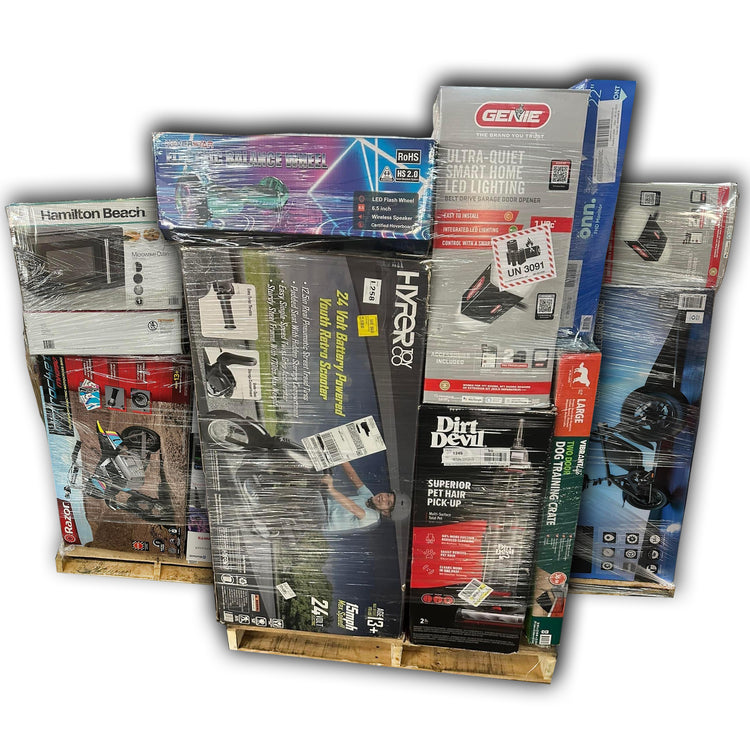Starting Your Liquidation Business: A Comprehensive Guide (2024)

Embarking on the journey of establishing your own liquidation business is an exciting endeavor fueled by passion, desire, and a dream of entrepreneurial success. The burning question echoing in your mind is whether delving into the liquidation business is a profitable venture. The resounding answer is a definite 'yes,' provided you approach it with the right strategy. In this guide, we will unravel the intricacies, share valuable tips, and equip you with the knowledge needed to kickstart and thrive in your liquidation business.
Understanding the Appeal of Liquidation Pallets
The liquidation business presents a unique advantage – it allows you to start small. Unlike other ventures, there's no prerequisite for extensive experience or a massive upfront capital investment. The key to success lies in being intelligent, moving strategically, and committing to putting in the necessary work. The liquidation industry is one where industriousness can outshine competitors, and valuable resources can be harnessed for free to acquire knowledge.
Smart Purchasing of Liquidation Products
Before diving into the world of liquidation pallets, it's crucial to be well-informed. Extensive research is vital to understanding how much inventory you can handle and where you'll store it. Effectively utilizing existing space, whether in your home or a storage facility, is paramount to keeping initial overheads low. Limited space can serve as a catalyst for focused selling, emphasizing the importance of moving products swiftly – a foundational skill for success in the liquidation business.
Whether opting for pallets or truckloads, the quantity of merchandise and required storage space vary. Purchasing by the pallet offers flexibility, requiring less storage, while truckloads demand more significant storage capacities. Additionally, consideration of staff size is essential, as it directly impacts your purchasing capacity.
Crafting a Winning Strategy: Selling Platforms and Product Selection
Success in the liquidation business hinges on a well-crafted strategy. Pre-purchase research should extend to evaluating potential sales channels. Local options like storefronts, flea markets, fairs, and bazaars provide immediate visibility. Venturing into online communities, especially on platforms like Facebook, not only opens sales avenues but also facilitates industry knowledge exchange.
Understanding your community's needs is paramount. Tailoring your product selection to fill gaps in the market ensures relevance and demand. Researching competitors, identifying niches, and adapting your offerings accordingly will set you apart. Testing the market with individual pallets before committing to larger quantities is a prudent approach.
Partnering with Reputable Sellers
Knowing what products you want to buy is only half the equation. Identifying reliable sellers is equally critical. While direct purchases from retailers might seem enticing, the involvement of a broker can be a game-changer. Brokers bring expertise to the table, securing the best deals and providing invaluable support.
Selling Your Liquidation Products: Strategy and Customer Service
Post-research, the focus shifts to creating a marketing strategy. Answering key questions about your product, sales channels, payment methods, and advertising lays the foundation for a profitable business. Pricing and advertising your product require a nuanced approach, leveraging social media, local markets, and platforms like Facebook Marketplace.
Choosing Sales Channels Wisely
Finalizing where to sell your liquidation truckloads is a critical decision. Starting locally and gradually expanding, either internationally or online, is advisable. However, each new sales channel requires meticulous integration, encompassing marketing, customer service, additional space, software, and staffing.
Utilizing diverse sales channels such as Amazon, Shopify, eBay, and social media offers versatility. However, newcomers should align their initial choices with their expertise. Starting with familiar platforms like flea markets minimizes complications, allowing for a smoother entry into the liquidation business.
Ensuring Customer Satisfaction: A Business Imperative
Achieving profitability involves more than strategic planning; customer satisfaction plays a pivotal role. Honesty, transparency, and clear communication about issue resolution build trust. Prioritizing relationship building over immediate sales fosters long-term customer loyalty.
Insider Tips for Selling on Major Platforms
Understanding the nuances of selling on platforms like eBay and Amazon is crucial. eBay, although vast, comes with oversight challenges, while Amazon demands professionalism and adherence to stringent guidelines. Leveraging programs like Amazon FBA and staying updated on new features, such as "Buy with Prime," can enhance your selling experience.
Pitfalls to Avoid in Liquidation Business
While the potential for success is immense, certain pitfalls can hinder business growth. These include attempting rapid expansion, neglecting research, fixating on secret sources, inflexibility, poor customer treatment, overcommitting cash, and neglecting the business aspect.
Key Takeaways for a Profitable Liquidation Business
In summary, success in the liquidation business necessitates:
- Prioritizing research: Know your market, product, and customers.
- Starting small: Begin locally and expand strategically.
- Diversifying sales channels: Leverage online platforms wisely.
- Ensuring customer satisfaction: Build trust for long-term success.
- Collaborating with professionals: Consider reputable platforms for advantageous deals.
Select Liquidation stands as a beacon for those entering the liquidation arena. Offering fair pricing, industry connections, and quality products.
